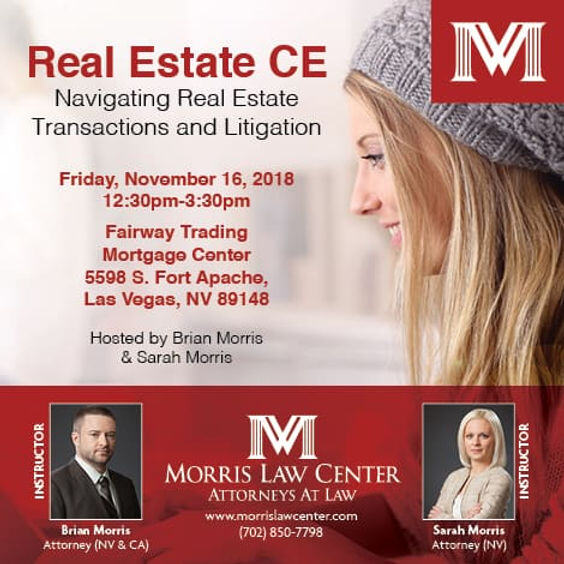This is part of an interview between Sarah Morris and Shaké Ajamian and Coby Baker of Alderus Mortgage, transcribed from an episode of Around the Gavel by Morris Law Center.
Can you just tell me a little bit about how Alderus got started?
15 years ago I was doing practice management and decided to move to Las Vegas. It was an interesting switch from small practices to real estate and mortgage. But what ended up happening was I got a job inside of a real estate practice and realize that they needed a lot of mortgage help. And this was in 2004 in Vegas. So in a very booming real estate economy and decided that, I’d use my finance degree for something it was intended to do, so I started a mortgage company.
So, what are some of the most common legal issues?
The most common is probably vesting, I think because that is a legal issue. Most people do not know how they want to vest. So we obviously don’t want to give that type of advice. So we’re going to refer back to legal counsel for something like that. That is the most common because we have to determine that on every single property that we finance. So that’s probably the most common I would say. But there’s a whole lot of uncommon as well.
Like Powers of Attorney. You know, you have a lot of times where you have powers of attorney, if you have people who are disabled or declared incompetent or incoherent or have medical issues, things like that. So, that becomes a problem because people generally don’t think about that. Or if something unexpected happens, then you know, what do you do when all of the sudden somebody goes into a coma? You have to have the ability to do something with the property and it’s very difficult and time consuming to, to make it so somebody else can do something with the property even if it’s a spouse.
Do you also have issues where there is a power of attorney and how do you handle the power of attorney?
I mean obviously you don’t have your durable powers of attorney, you have various types of your specific power of attorney. But it depends. There it gets complicated and tight. I guess the time is generally what causes the most problem because generally people want to do something quickly. And that becomes the biggest problem is when you have somebody that’s incapacitated for some reason or, like there’s laws, for example, if you’re on a morphine drip or if you have something like that where you can’t actually sign, and you have to, in this state, sign spousal deeds and things like that. So it’s an interesting conundrum, especially in States like Nevada. Sometimes it’s the specific type of powers of attorney that cause problems. Or you have people traveling abroad as well. So trying to get people, somebody here, people in the military, or you’ve got spouse somewhere. There’s a lot that has to be done.
What other unusual things have you had?
Vesting in a trust is always interesting. Vesting in a trust can be complicated as well. I mean it’s a complicayed as well. Just think of the size of a mortgage package in today’s day and age, all of the disclosures and everything that we have to do, pretty much everything that we have a client sign is potentially dangerous for us in some way, shape or form. But it’s kinda sad because you know, the average package right now that a client signs for FHA is about 140-something pages of documents. And that’s really hard to digest for an average consumer. And the majority of those documents are legally drawn documents from a myriad, from 50 years of legal precedent. So there’s more than you could ever imagine in a mortgage package.
That’s interesting that you bring up the trust thing because I always counsel my clients to just, unless they’re literally going to pay for the property and found the mortgage with the trust, just put it in your name and then transfer the deed after.
Honestly that’s the best way, is close in your name and do what you need to after. But not only do people try doing it with trust, but you also have people who try and move through LLCs, triple LLCs. Like you have all kinds of things that people are trying to do and it gets problematic from a standpoint of you know, a mortgage loan is a recourse, there’s a recourse loan and a lot of people, what they’re trying to do in a lot of instances is protect from, you know, in some kind of non-recourse situation. And there really is not a lot of good ways to do that because we’re not going to invest in an LLC or a corporation or something like that. But people are going to do things after they closed, and I think the same goes for a trust, close it in your name, do what you need to do after, do whatever you need to do. You know, once that’s done it far simpler, cleaner, easier and it keeps it away from the mortgage side.





